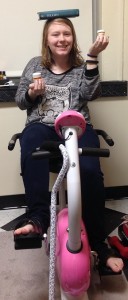
There’s a reason no one says that living with a chronic illness is easy: because it isn’t. Living with Postural Orthostatic Tachycardia Syndrome (POTS), a form of dysautonomia, can be especially challenging at times. However, there are ways, with practice, to manage life with dysautonomia and find your own version of normal
One of the most important things for me has been to realize is that no one is perfect. There will be good days, and there will be bad days. I have had bad days that felt as if they would never end. On some bad days, I get angry and upset. I want to be able to do things my peers are doing, but the fact of the matter is that I can’t always do that. I think it’s important to allow yourself small increments of time every now and again to get upset in order to release pent-up emotions. I think it’s just as important not to dwell on those bad days, though, because, in the long-run, just being frustrated doesn’t fix anything.
So, I’m not like most of my peers. This is a fact that I’ve learned to accept. In order to keep myself from spending too much time comparing myself to others, I focus on things I like and things I can do. As a college student, I spend a good amount of time on my studies, which is something pretty normal for any student, and I enjoy that sense of normalcy. Anchoring myself in school work definitely helps me. I do my best not to isolate myself from others. I have a single dorm room, which really helps me manage my POTS since I’m able to sleep and rest when needed. While it’s sometimes tempting to stay in my room by myself constantly, I push myself to talk and interact with friends, and in the end, even if doing these things leaves me tired, I find that it also leaves me feeling better emotionally.
I would be wrong to say that I’m able to forget about my POTS entirely. Since I can’t ignore the fact that I have POTS, as that would make it far worse, I do my best to manage it. I take my medications, drink lots of fluids, increase my salt intake and exercise to keep my POTS under control (as under control as possible). With some reluctance, I use a shower chair, so I can sit down while showering, and also use a cane on days where I’m feeling especially off-balance. The reluctance is because I feel too young to need these things. I quickly realized, though, that these are tools to help me, and if there’s something that can help me, then I should take advantage of it. There is no shame in helping myself and making living with my illness easier.
Humor is something else that helps me stay positive. The reality of living with a chronic illness that few doctors know of is scary sometimes. Having a doctor say he or she doesn’t know what to do is terrifying because I thought from a young age that doctors were the people who would make me better if I was sick. There is no magic cure for me or the millions of other people living with POTS. Although I realize this, I still try to find humor in small things, like seeing ads for compression stockings online geared toward seniors and saying, “I would totally wear those,” or joking that I have a great sense of balance, when in reality sometimes I feel like I’m in a funhouse when standing on two feet, forget standing on one.
Sometimes it’s hard to do everything at once; it’s easy to get overwhelmed by school, relationships with others, and POTS. Most people my age are not so focused on their health. In the end, though, while POTS is a huge part of my life, it is not my life. I work hard to ensure that I balance everything at once so I can be as healthy and happy as possible. While I’ve yet to find the perfect balance, I’ve learned to laugh along the way.
Guest blogger Emily Deaton is a sophmore at James Madison University majoring in English and minoring in Nonprofit Studies. She recently wrote an article on living with a chronic illness as a teenager for the Richmond Times Dispatch. When she isn’t studying, you can find her spending time with friends and participating in JMU’s InterVarsity Christian Fellowship.